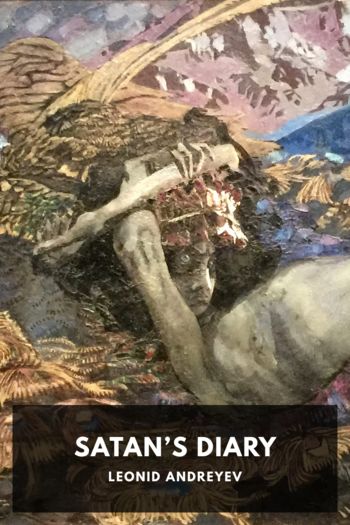Satan’s Diary - Leonid Andreyev (rom com books to read .txt) 📗

- Author: Leonid Andreyev
Book online «Satan’s Diary - Leonid Andreyev (rom com books to read .txt) 📗». Author Leonid Andreyev
This letter of Countess Tolstoy called forth a storm of protest in the Russian press, and, strange to say, the representatives of the fair sex were among the warmest defenders of the young author. Answering the attack, many women, in their letters to the press, pointed out that the author of Anna Karenina had been abused in almost the same manner for his Kreutzer Sonata, and that Tolstoy himself had been accused of exerting just such an influence as the Countess attributed to Andreyev over the youth of Russia. Since the publication of Countess Tolstoy’s condemnation, Andreyev has produced a series of masterpieces, such as The Life of Father Vassily, a powerful psychological study; Red Laughter, a war story, “written with the blood of Russia;” The Life of Man, a striking morality presentation in five acts; Anathema, his greatest drama; and The Seven Who Were Hanged, in which the horrors of Russian life under the Tsar were delineated with such beautiful simplicity and power that Turgenev, or Tolstoy himself, would have signed his name to this masterpiece.
Thus the first accusations against Andreyev were disarmed by his artistic productions, permeated with sincere, profound love for all that is pure in life. Dostoyevsky and Maupassant depicted more subjects, such as that treated in “The Abyss,” than Andreyev. But with them these stories are lost in the great mass of their other works, while in Andreyev, who at that time had as yet produced but a few short stories, works like “The Abyss” stood out in bold relief.
I recall my first meeting with Leonid Andreyev in 1908, two weeks after my visit to Count Leo Tolstoy at Yasnaya Polyana. At that time he had already become the most popular Russian writer, his popularity having overshadowed even that of Maxim Gorky.
As I drove from Terioki to Andreyev’s house, along the dust-covered road, the stern and taciturn little Finnish driver suddenly broke the silence by saying to me in broken Russian:
“Andreyev is a good writer. … Although he is a Russian, he is a very good man. He is building a beautiful house here in Finland, and he gives employment to many of our people.”
We were soon at the gate of Andreyev’s beautiful villa—a fantastic structure, weird-looking, original in design, something like the conception of the architect in the Life of Man.
“My son is out rowing with his wife in the Gulf of Finland,” Andreyev’s mother told me. “They will be back in half an hour.”
As I waited I watched the seething activity everywhere on Andreyev’s estate. In Yasnaya Polyana, the home of Count Tolstoy, everything seemed long established, fixed, well-regulated, serenely beautiful. Andreyev’s estate was astir with vigorous life. Young, strong men were building the House of Man. More than thirty of them were working on the roof and in the yard, and a little distance away, in the meadows, young women and girls, bright-eyed and red faced, were haying. Youth, strength, vigor everywhere, and above all the ringing laughter of little children at play. I could see from the window the “Black Little River,” which sparkled in the sun hundreds of feet below. The constant noise of the workmen’s axes and hammers was so loud that I did not notice when Leonid Andreyev entered the room where I was waiting for him.
“Pardon my manner of dressing,” he said, as we shook hands. “In the summer I lead a lazy life, and do not write a line. I am afraid I am forgetting even to sign my name.”
I had seen numerous photographs of Leonid Andreyev, but he did not look like any of them. Instead of a pale-faced, sickly-looking young man, there stood before me a strong, handsome, well-built man, with wonderful eyes. He wore a grayish blouse, black, wide pantaloons up to his knees, and no shoes or stockings.
We soon spoke of Russian literature at the time, particularly of the drama.
“We have no real drama in Russia,” said Andreyev. “Russia has not yet produced anything that could justly be called a great drama. Perhaps The Storm, by Ostrovsky, is the only Russian play that may be classed as a drama. Tolstoy’s plays cannot be placed in this category. Of the later writers, Anton Chekhov came nearest to giving real dramas to Russia, but, unfortunately, he was taken from us in the prime of his life.”
“What do you consider your own Life of Man and To the Stars?” I asked.
“They are not dramas; they are merely presentations in so many acts,” answered Andreyev, and, after some hesitation, added: “I have not written any dramas, but it is possible that I will write one.” At this point Andreyev’s wife came in, dressed in a Russian blouse. The conversation turned to America, and to the treatment accorded to Maxim Gorky in New York.
“When I was a child I loved America,” remarked Andreyev. “Perhaps Cooper and Mayne Reid, my favorite authors in my childhood days, were responsible for this. I was always planning to run away to America. I am anxious even now to visit America, but I am afraid—I may get as bad a reception as my friend Gorky got.”
He laughed as he glanced at his wife. After a brief





Comments (0)